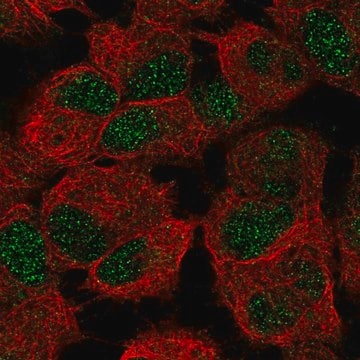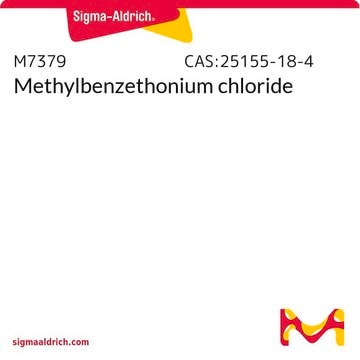C8104
Monoclonal Anti-Ceramide antibody produced in mouse
clone MID 15B4, purified immunoglobulin, buffered aqueous solution
Synonyme(s) :
Ceramide Antibody, Ceramide Antibody - Monoclonal Anti-Ceramide antibody produced in mouse
About This Item
IHC (f)
indirect ELISA: 1:10
Produits recommandés
Source biologique
mouse
Niveau de qualité
Conjugué
unconjugated
Forme d'anticorps
purified immunoglobulin
Type de produit anticorps
primary antibodies
Clone
MID 15B4, monoclonal
Forme
buffered aqueous solution
Technique(s)
immunohistochemistry (frozen sections): suitable
indirect ELISA: 1:10
Isotype
IgM
Conditions d'expédition
wet ice
Température de stockage
2-8°C
Modification post-traductionnelle de la cible
unmodified
Catégories apparentées
Description générale
Spécificité
Immunogène
Application
- immunohistochemistry
- immunolabeling in electron microscopy
- enzyme-linked immunosorbent assay (ELISA)
- immunoblotting
- immunoprecipitation
- as a probe to determine the presence and roles of ceramide in sphingomyelin pathway signaling and the regulation of protein phosphorylation.
Actions biochimiques/physiologiques
Forme physique
Notes préparatoires
Remarque sur l'analyse
Clause de non-responsabilité
Vous ne trouvez pas le bon produit ?
Essayez notre Outil de sélection de produits.
Code de la classe de stockage
10 - Combustible liquids
Point d'éclair (°F)
Not applicable
Point d'éclair (°C)
Not applicable
Faites votre choix parmi les versions les plus récentes :
Certificats d'analyse (COA)
Vous ne trouvez pas la bonne version ?
Si vous avez besoin d'une version particulière, vous pouvez rechercher un certificat spécifique par le numéro de lot.
Déjà en possession de ce produit ?
Retrouvez la documentation relative aux produits que vous avez récemment achetés dans la Bibliothèque de documents.
Les clients ont également consulté
Notre équipe de scientifiques dispose d'une expérience dans tous les secteurs de la recherche, notamment en sciences de la vie, science des matériaux, synthèse chimique, chromatographie, analyse et dans de nombreux autres domaines..
Contacter notre Service technique









